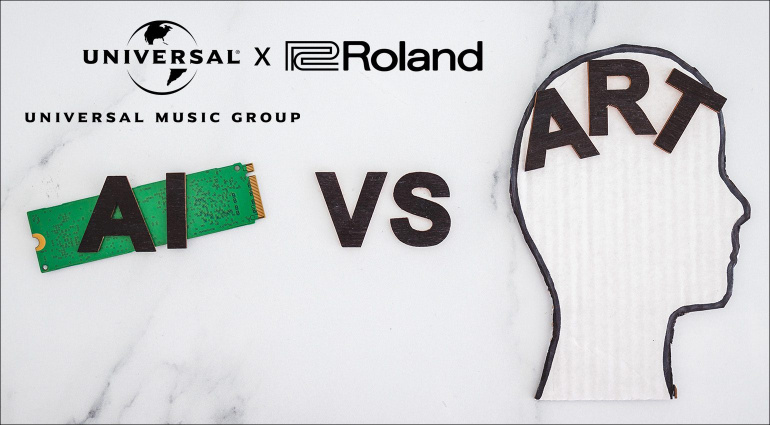AIformusic: Roland and Universal Music Group, two leading companies in the music industry, announced a strategic partnership in March 2024. Today, 50 companies in music and tech have signed this agreement to join forces and fight for the “right thing”.
What Roland and UMG announced in March 2024
Roland and UMG, the world’s most profitable major record label, want to fight against the unlimited use of AI in their fields—music and music technology—rather than using this technology for more human creativity. Both companies emphasized in their agreement how important central music and music-making are for everyone. The result of the new agreement is a creative interplay between new technologies and the artistic spirit of a (real) musician.
As a first step, Roland and UMG have formulated seven principles for AI-powered music production that highlight the opportunities for innovation in music production, composition, and songwriting. These principles also emphasize the importance of transparency, equity, and community participation. They are called Principles for Making Music with AI.
- We believe music is central to humanity.
- We believe humanity and music are inseparable.
- We believe that technology has long supported human artistic expression, and applied sustainably, AI will amplify human creativity.
- We believe that human-created works must be respected and protected.
- We believe that transparency is essential to responsible and trustworthy AI.
- We believe the perspectives of music artists, songwriters, and other creators must be sought after and respected.
- We are proud to help bring music to life.
Under the umbrella of AIformusic, both heavyweights publicly stated how important the use of AI and the protection of rights holders and musicians will be in the future of AI-powered music production. Only three months later, a staggering 50 leading music tech companies have signed on.
The big 50: These Companies have signed AIformusic’s agreement
Today, ever fifty global music technology companies and associations expressed their support for the Principles for Making Music with AI initiated by Roland and UMG. Among the signees are industry heavyweights like BandLab Technologies, Splice, Beatport, Focusrite, Output, LANDR, Waves, Eventide, Native Instruments, NAMM, Sequential and Oberheim.
Together they hope to further protect the rights of all musicians as the industry experiences an acceleration of generative AI technology and AI-powered music production. The guidelines were established to encourage key players in the music technology space to be aware of the potential risks of AI.
AIformusic states that managing the impact of machine learning tools responsibly is crucial. Every signing member is asked to adhere to these principles to protect the integrity of artists in the music industry. At the same time, AIformusic recognizes that AI can be a powerful tool for musicians and creatives when used cautiously.
AI-powered music production: Bandlab, Splice and Focusrite leaders have this to say
Meng Ru Kuok, CEO and co-founder of BandLab Technologies, says of the principles: “We are at a pivotal moment in the evolution of music making. As leaders, it is our responsibility to ensure that AI supports artists and respects their creative integrity. As we develop new tools, we must remember that technology is at its best when it augments human creativity, not overshadows it.”
Kakul Srivastava, CEO of Splice, adds, “AI is bringing new possibilities to our industry, and many musicians are inspired by these tools. But this is a crucial time to support them responsibility in using new technology and to respect the rights of creators everywhere. It’s about putting people at the center.”
Tim Carroll, CEO of Focusrite PLC, elaborates: “As with all emerging technology, Focusrite Group wants AI to become another tool to enhance artists’ creativity rather than a threat to our industry. We are proud to support AI for Music and ensure that this technology is utilized responsibly.”
RIAA vs. Suno and Udio
Earlier today, the Recording Industry Association of America (RIAA) announced that it was indeed considering a lawsuit against AI-powered music production tools Suno and Udio (as we reported earlier) for copyright infringement. The lawsuit seeks damages of up to 150,000 US dollars for each infringed work and seeks to prevent the two AI companies from accessing the labels’ copyrighted songs.
On the other hand, UMG also announced recently that it will be partnering with Soundlabs for their upcoming vocal transformation tool MicDrop. UMG artists will be able to use the tool and train it with their own vocal recordings. So, it does not look like the major labels are completely against AI-powered music production (I wouldn’t be surprised to find the use of AI in generating lyrics and melodies is already wide-spread among many high-level producers and songwriters in pop music).






